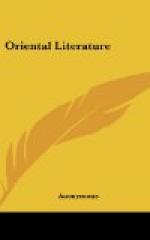Among the young women was Ibla, daughter of Malek, the son of Zoheir. Ibla, fair as the full moon, was somewhat younger than Antar. She was accustomed to banter him in a familiar way, feeling that he was her slave. “And you,” she said to him, “you, born so low, how dared you kill the slave of a prince? What provocation can you have against him?” “Mistress,” replied Antar, “I struck that slave because he deserved it, for he had insulted a poor woman. He knocked her down, and made her the laughing stock of all the servants.” “Of course you were right,” answered Ibla, with a smile, “and we were all delighted that you escaped from the adventure safe and sound. Because of the service you have rendered us by your conduct, our mothers look upon you as a son, and we as a brother.”
From that moment Antar made the service of women his special duty above all others. At that time the Arabian ladies had the habit of drinking camel’s milk morning and evening, and it was especially the duty of those who waited upon them to milk the camels, and to cool it in the wind before offering it to them. Antar had been for some time released from this duty, when one morning he entered the dwelling of his uncle Malek, and found there his aunt, engaged in combing the hair of her daughter Ibla, whose ringlets, black as the night, floated over her shoulders. Antar was struck with surprise, and Ibla, as soon as she knew that he had seen her, fled and left him with his eyes fixed abstractedly on her disappearing form.
It was from this incident that the love of Antar for the daughter of his uncle took its origin. He saw how Ibla shone in society, and his passion grew to such an extent that he ventured to sound her praises, and to express the feeling she excited in him by writing verses which, while they gained the admiration of the multitude, incurred also the envy of the chieftains. Moreover his father could not pardon the presumption of Antar, who, born a slave, had dared to cast eyes on his free-born cousin.
When therefore he slew a slave who had slandered him, his father ordered him to be flogged, and sent away to watch over the cattle in the pastures. He had now before him a fresh opportunity for exhibiting his prodigious strength and invincible courage. A lion attempted to attack the herds committed to his care. He killed it at the very moment that his father Shedad, enraged against him, had come, accompanied by his brother, to do him ill. But a mingled feeling of admiration and fear held their hands, and in the evening, when Antar returned from the pastures, his father and his uncle made him seat himself at dinner with them, while the rest of the attendants stood behind them.




